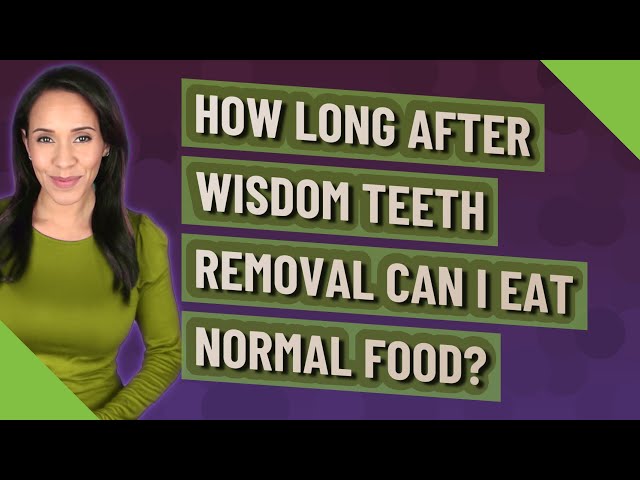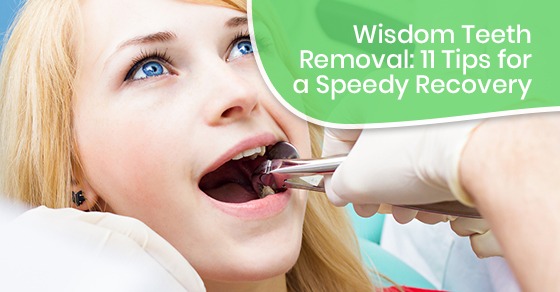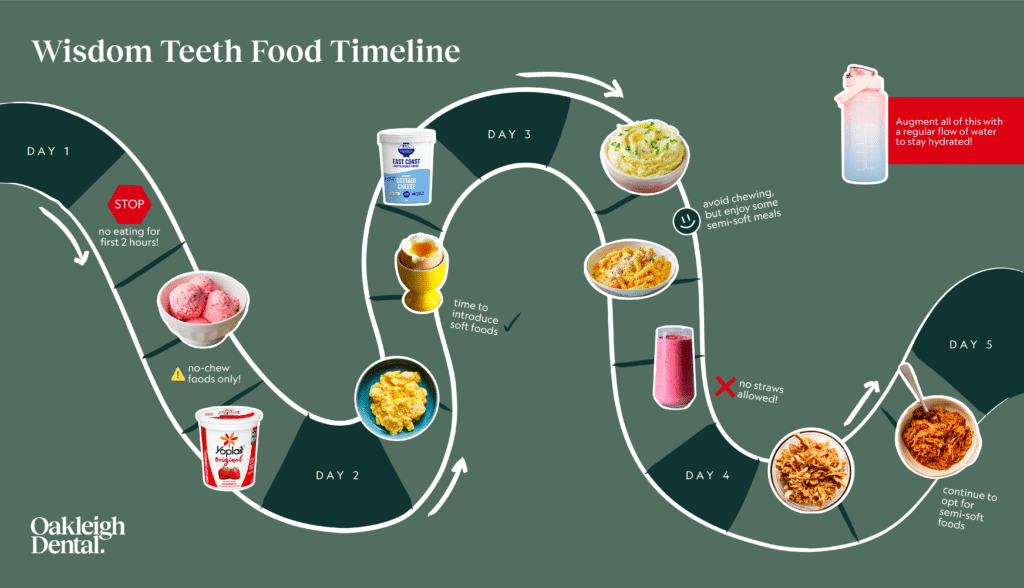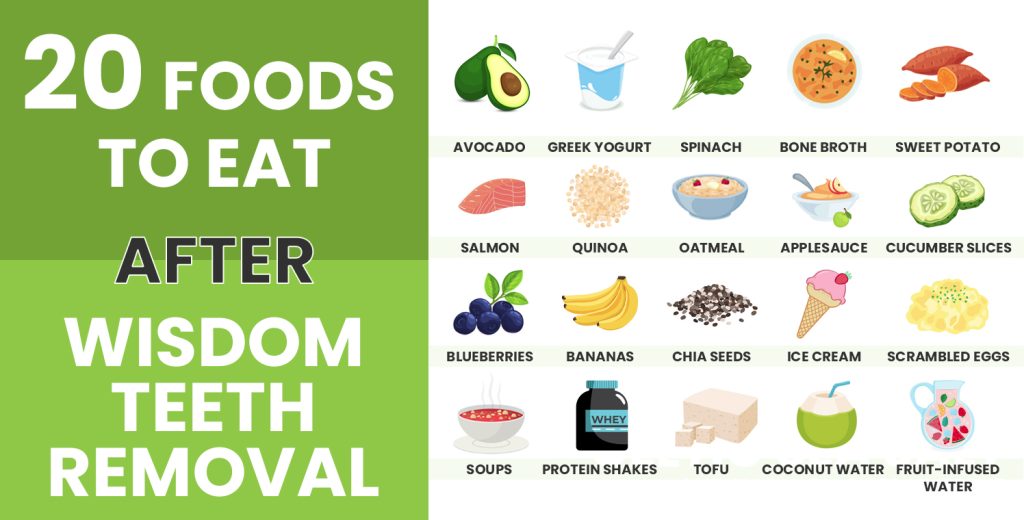Wisdom teeth removal, also known as third molar extraction, is a common dental procedure to alleviate pain, prevent overcrowding, and avoid potential oral health issues. While the procedure itself is relatively straightforward, the recovery period can vary from person to person. Understanding what to eat after wisdom teeth removal, what to expect during the recovery process, and how to aid your body’s healing can make a significant difference in your overall experience.
When Can I Eat After Wisdom Teeth Removal?
Patients often wonder when it’s safe to resume eating regular foods after wisdom teeth extraction. While the timeline may vary for each individual, most dentists recommend gradually reintroducing solid foods once the initial swelling and discomfort have subsided, typically after a few days.

Understanding the Recovery Time
Immediate Post-Operative Period
Immediately after the surgery, it’s normal to experience some bleeding and swelling. Your dentist or oral surgeon will provide you with specific instructions on managing these symptoms, including using gauze pads to control bleeding and applying ice packs to reduce swelling. Following these instructions carefully is essential to promote proper healing and minimize discomfort.
Short-Term Recovery
In the days following the procedure, you may experience some pain and discomfort, which can typically be managed with over-the-counter pain medications prescribed by your dentist. It’s crucial to rest and avoid strenuous activities during this time to allow your body to heal properly.
Long-Term Recovery
While most people recover from wisdom teeth removal within a week or two, full healing can take several weeks. During this time, it’s essential to continue practicing good oral hygiene, including gentle brushing and rinsing with salt water, to prevent infection and promote healing.

Tips for Speeding Up Recovery
Following these tips can help speed up your recovery process and minimize discomfort:
Follow Post-Operative Instructions
Listen to your dentist or oral surgeon’s advice regarding diet, medication, and oral hygiene practices. Avoid smoking, drinking through a straw, or engaging in activities that could dislodge blood clots and impede healing.
Manage Pain and Swelling
Take prescribed pain medications as directed and use ice packs to reduce swelling. Avoid placing ice directly on the surgical site to prevent frostbite. If pain or swelling persists or worsens, contact your dentist or oral surgeon.
Maintain Oral Hygiene
Gently brush your teeth and rinse your mouth with salt water to keep the surgical site clean and free of debris. Avoid vigorous rinsing or spitting, as this could disrupt the healing process.

Supplement Significance: Supporting Healing with Nutrients
After wisdom teeth removal, supplements can play a crucial role in supporting healing and recovery. Certain nutrients like vitamin C, vitamin D, and calcium are essential for bone health and tissue repair. Additionally, omega-3 fatty acids can help reduce inflammation and promote oral health. Discussing with your dentist or oral surgeon about potential supplements can ensure you’re meeting your body’s increased nutritional needs during this time. However, always consult with a healthcare professional before starting any new supplement regimen.
Dietary Guidelines After Wisdom Teeth Extraction
Proper nutrition is crucial for optimal healing after wisdom teeth removal. A soft diet is recommended during the initial stages of recovery to minimize discomfort and reduce the risk of complications.
Importance of Nutrition
Eating nutrient-rich foods can help support your body’s healing process and reduce the risk of infection. Focus on consuming foods that are high in vitamins, minerals, and protein to promote tissue repair and regeneration.
Soft Foods: Your Best Friends
Soft foods are gentle on the surgical site and easier to chew, making them ideal choices for the first few days following wisdom teeth removal. Examples include:
- Applesauce
- Yogurt
- Mashed potatoes
- Soup
- Smoothies
- Oatmeal

What to Eat After Wisdom Teeth Removal?
One of the most common questions people have after wisdom teeth removal is what to eat during the recovery period. Here are some nutritious options to consider:
- Scrambled Eggs: High in protein and easy to eat, scrambled eggs are a filling and nutritious option for breakfast or any meal of the day.
- Avocado: Soft and creamy, avocado is packed with healthy fats, vitamins, and minerals, making it an excellent choice for promoting healing.
- Bananas: Rich in potassium and easy to digest, bananas are a great source of energy and can help replenish electrolytes lost during surgery.
- Greek Yogurt: Smooth and creamy, Greek yogurt is high in protein and probiotics, which can aid digestion and support immune health.
- Mashed Sweet Potatoes: Soft and flavorful, mashed sweet potatoes are loaded with vitamins and antioxidants, making them an excellent choice for promoting overall health and well-being.
Hydration: Drink Plenty of Fluids
Staying hydrated is essential for proper healing after wisdom teeth removal. Be sure to drink plenty of water and other fluids throughout the day to prevent dehydration and promote optimal healing.
Foods to Avoid After Wisdom Teeth Removal
While it’s essential to eat nutrient-rich foods during the recovery period, there are certain foods you should avoid to prevent complications and promote healing.
- Hard and Crunchy Foods: Avoid hard and crunchy foods that could irritate the surgical site or dislodge blood clots, such as nuts, chips, and hard candies.
- Spicy Foods: Spicy foods can cause discomfort and irritation, especially in the days following surgery. It’s best to avoid them until your mouth has fully healed.
- Carbonated Drinks: Carbonated drinks can increase the risk of dry socket, a painful condition that occurs when the blood clot at the surgical site becomes dislodged. Stick to plain water and other non-carbonated beverages instead.

Why No Dairy After Tooth Extraction?
While dairy products are generally nutritious and beneficial for oral health, they can be problematic immediately after wisdom teeth removal. Dairy products can create a film in the mouth, making it difficult to keep the surgical site clean and increasing the risk of infection. It’s best to avoid dairy products until your dentist or oral surgeon gives you the all-clear.
Conclusion
Recovering from wisdom teeth removal requires patience, diligence, and proper self-care. By following your dentist or oral surgeon’s post-operative instructions, maintaining good oral hygiene, and eating a nutritious diet, you can promote healing and minimize discomfort during the recovery process.
FAQs
1. What to eat after wisdom teeth removal?
- After wisdom teeth removal, it’s best to stick to soft, nutritious foods like scrambled eggs, mashed potatoes, yogurt, and smoothies to promote healing.
2. How long does it take to recover from wisdom teeth removal?
- While most people recover within a week or two, full healing can take several weeks, depending on individual factors and the complexity of the surgery.
3. Can I eat solid foods after wisdom teeth removal?
- It’s best to stick to a soft diet for the first few days following surgery to minimize discomfort and reduce the risk of complications. Gradually introduce solid foods as your mouth heals and your dentist gives you the all-clear.
4. Why is it important to eat well after wisdom teeth removal?
- Proper nutrition is crucial for supporting your body’s healing process and reducing the risk of infection. Eating soft, nutrient-rich foods can help promote tissue repair and regeneration.
5. How can I speed up the recovery process after wisdom teeth removal?
- Follow your dentist or oral surgeon’s post-operative instructions, manage pain and swelling with prescribed medications and ice packs, maintain good oral hygiene, and eat a nutritious diet rich in vitamins, minerals, and protein.
